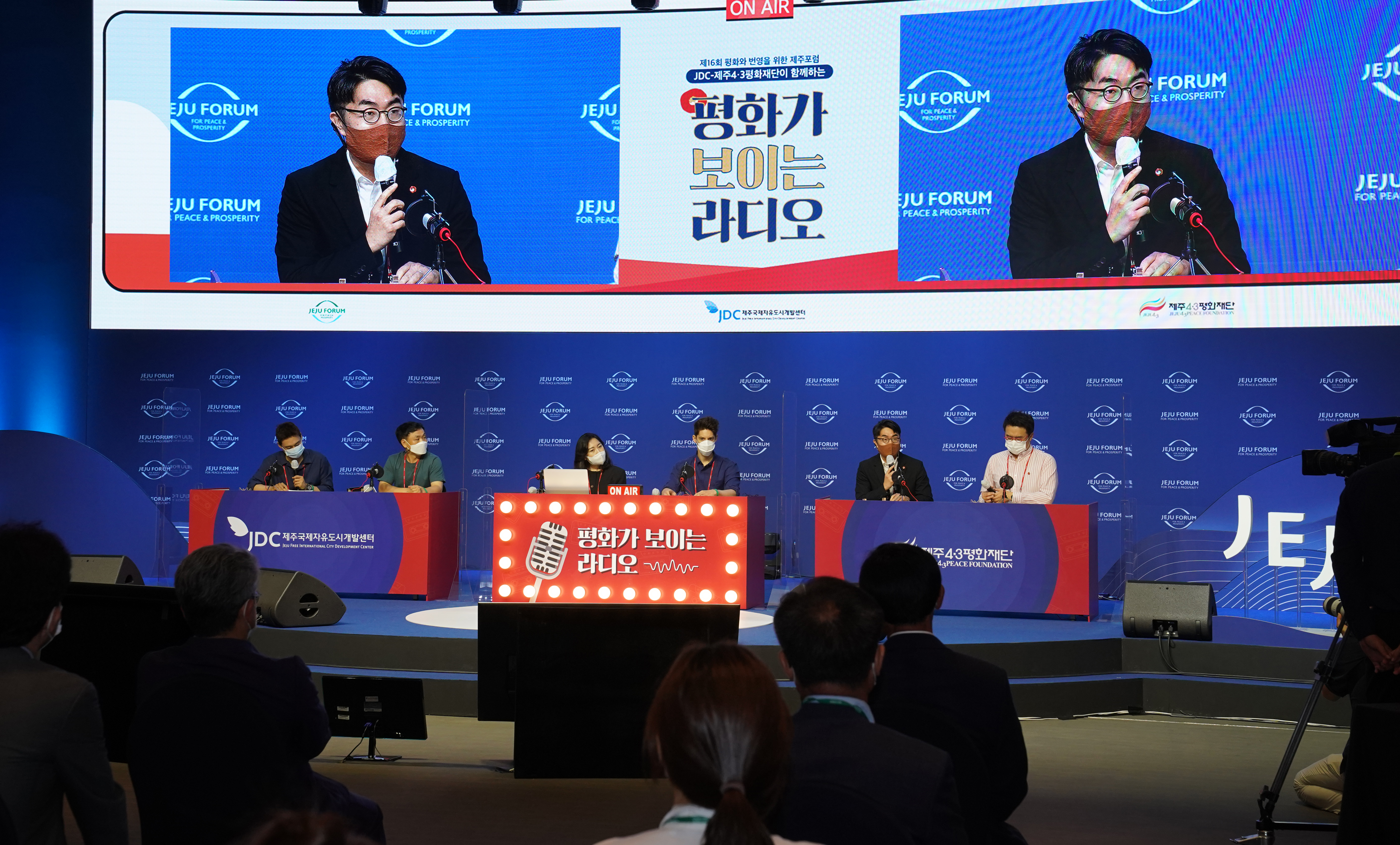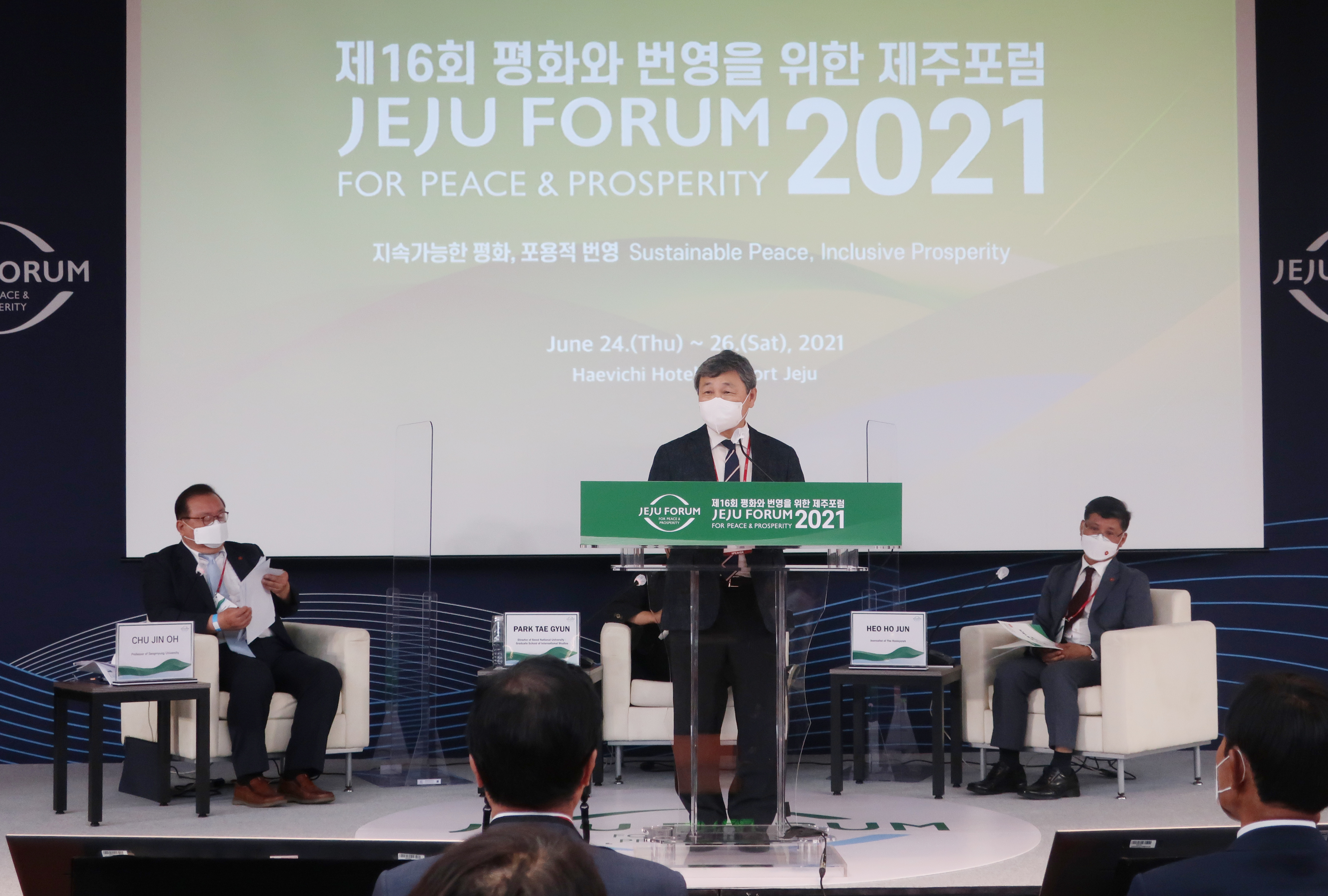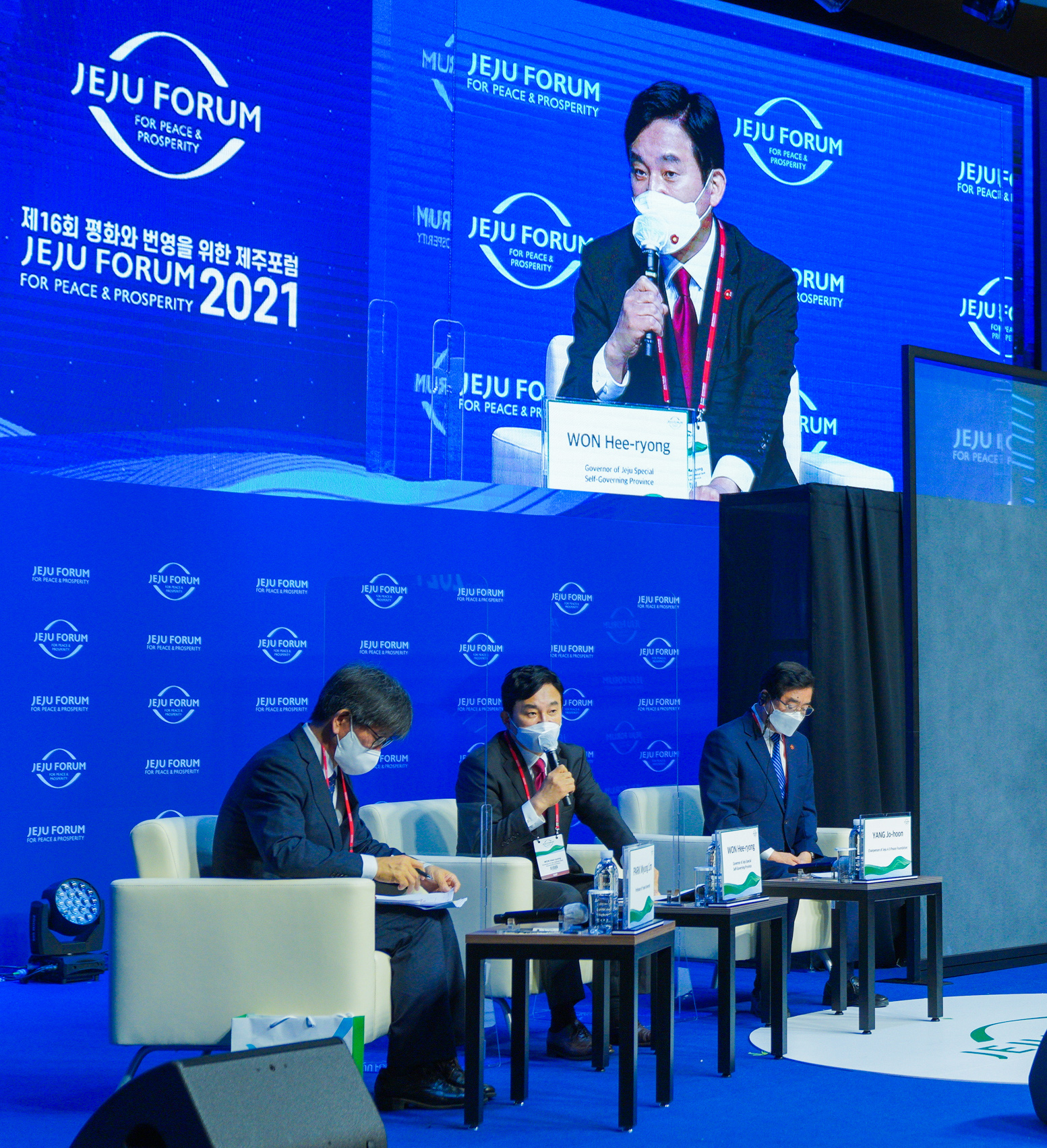Sustainable Peace, Pull Together for Inclusive Prosperity
Ko Eun-kyung, Research Department, Jeju 4·3 Peace Foundation
 The Peace Radio Show of Youth session was held at Haevichi Hotel & Resort Jeju on June 24, as a side event of the Jeju Forum for Peace & Prosperity 2021.
The Peace Radio Show of Youth session was held at Haevichi Hotel & Resort Jeju on June 24, as a side event of the Jeju Forum for Peace & Prosperity 2021.
The 16th Jeju Forum for Peace & Prosperity, which was opened at Haevichi Hotel & Resort Jeju on June 24, successfully concluded its three-day program on June 26. This year’s forum, whose theme was determined for “Sustainable Peace, Inclusive Prosperity”, was held soon after the general revision of the Jeju 4·3 Special Act. The forum was a significant opportunity to revisit the spirit of peace of Jeju 4·3 by viewing as an incident of significance to world history.
Peace Radio Show: An emphasis on the role of the generation of the future
The forum began on June 24 with the Peace Radio Show session, co-hosted by the Jeju 4·3 Peace Foundation and the Jeju Free International City Development Center (JDC). It was a program to have a talk with young people, deeply examining on the implications of Jeju 4·3 and the goal of realizing a peaceful, inclusive society. With the emceeing of announcer Oh Sang-jin, the show proceeded with an interview of Yang Jo Hoon, the president of the Jeju 4·3 Peace Foundation, and Moon Dae-lim, the CEO of the JDC, as well as a lecture on Jeju 4·3 by Choi Tae-sung, a Korean history lecturer. The session was joined by many panelists to deliver the significance of Jeju 4·3 regarding peace to the future generation, including Fabien Corbineau, a broadcaster, Shin Hye-rim, a Christian Broadcasting System (CBS) producer, Kim Sung-hyun, a screenwriter, and Ban Young-kwan, a Jeju 4·3 Peace Foundation researcher.
JDC leader Moon said, “Jeju is designated as “an island of world peace”, which symbolizes the realization of coexistence by overcoming conflict and discrimination. The spirit of reconciliation and co-prosperity represented by Jeju 4·3 contains the humanistic value and foundation of Jeju Island.” President Yang of the Jeju 4·3 Peace Foundation added, “Jeju 4·3 is an incident with a historical importance at a global level, which took place on Jeju Island as a result of the Cold War. We all need to empathize with it so as to be reminded of the incident and pass on its value of peace.” Speaking up about “young people’s active participation,” he also stressed to the young generation that “to empathize about Jeju 4·3, we need to renew our view of national division and the Cold War and have a new understanding of how we are addressing them at present.”
Korean history teacher Choi explained the unfolding of Jeju 4·3 and lessons to be learned from the tragic incident in his lecture. He demanded that we expand Jeju 4·3 into the realm of human rights, which are the universal values to be shared by people around the world. Jeju 4·3 would usher in a future where we focus on human rights rather than ideology,” he expected.
Screenwriter Kim, French broadcaster Corbineau, CBS producer Shin, and Jeju 4·3 researcher Ban led the talk show following the opening remarks. The panelists spoke on the past and present of Jeju 4·3, and of an island of peace in the future.” They discussed the people’s efforts to engrave Jeju 4·3 as a symbolic historical event of peace and human rights in their respective positions and reaffirmed the intent to realize peace.
 (From left) Professor Chu Chinoh of Sangmyung University, Professor Park Tae-gyun, the director of the Graduate School of International Studies at Seoul National University, Huh Ho-joon, a Hankyoreh senior correspondent attended the session, titled “4·3, World Cold War and Peace”. The session was hosted by the Jeju 4·3 Research Institute.
(From left) Professor Chu Chinoh of Sangmyung University, Professor Park Tae-gyun, the director of the Graduate School of International Studies at Seoul National University, Huh Ho-joon, a Hankyoreh senior correspondent attended the session, titled “4·3, World Cold War and Peace”. The session was hosted by the Jeju 4·3 Research Institute.
Jeju 4·3 Research Institute’s session on Jeju 4·3: A review of Jeju 4·3 as an event of significance to world history
On June 25, the Jeju 4·3 session organized by the Jeju 4·3 Research Institute was held. It was a forum to view Jeju 4·3 and of the Cold war from an international perspective under the theme of “4·3, World Cold War and Peace.” The session attempted to predict the future of peace, national unification, human rights, and harmony of the people. Particularly, the participants re-examined the efforts to discover the truth of Jeju 4·3 by building a correct understanding of the Cold War, a major cause of Jeju 4·3. Jung Keun-sik, the chairman of the nation’s Truth and Reconciliation Commission, delivered the keynote speech with the topic of “4·3, the (Post-)Cold War Era and Peace”. Jung pointed out that the Cold War was deeply entwined with Taiwan’s 2.28 incident, the Chinese Civil War and Jeju 4·3. Understandably, the three incidents have a commonality in times which can expand the temporal and spatial horizon of Jeju 4·3, he added. The national commission leader also reiterated that it is now time to think about what it implies for Jeju to achieve peace while talking about Jeju 4·3.”
In a speech with “Massacres in Southeast Asia in the 1960s and Jeju,” Seoul National University’s professor Park stated that Jeju 4·3, which occurred in 1948, was a massacre case that “culminated the trajectory of the Cold War.” Park also mentioned that we needed to broaden our perspective of viewing Jeju 4·3 from a local one to a world historical one. “We must see and understand Jeju 4·3 from a world historical view in connection with other massacres that occurred in Vietnam and Malaysia, he stressed. He said that establishing such a perspective could expand the perception and create social consensus in which Jeju 4·3 is not an issue of ideology but of the universal issue of humanity. Concluding his speech, Jung asserted that in doing so, we could secure the universality and specificity of Jeju 4·3.
The session was moderated by professor Chu of Sangmyung University, with professor Hajimu Masuda of National University of Singapore and journalist Huh Ho-jun invited for the discussion. The panelists and discussants exchanged their opinions about the past political issues related to Jeju 4·3, the need to discuss them together as social issues, and how to resolve the issues once the revised Jeju 4·3 Special Act goes into effect.
 (From left) Park Myung-rim, a professor of Yonsei University, Won Hee-ryong, the governor of Jeju Special Self-Governing Province, and Yang Jo Hoon, the president of the Jeju 4·3 Peace Foundation met at the forum’s closing session, titled, “Towards a Universal Model of Reconciliation, Peace, and Healing: From Jeju to the World.”
(From left) Park Myung-rim, a professor of Yonsei University, Won Hee-ryong, the governor of Jeju Special Self-Governing Province, and Yang Jo Hoon, the president of the Jeju 4·3 Peace Foundation met at the forum’s closing session, titled, “Towards a Universal Model of Reconciliation, Peace, and Healing: From Jeju to the World.”
4·3, emerging as a model of resolving issues related to past history
At the closing session on June 26, Won Heeryong, the governor of Jeju Special Self-Governing Province, Park Myung-rim, a professor of Yonsei University, and Yang Jo Hoon, the president of the Jeju 4·3 Peace Foundation, shared their suggestions with the audience concerning the universal model of Jeju 4·3’s reconciliation, peace, and healing, under the topic of “4·3 and Justice, Reconciliation and Restoration.” Professor Park of Yonsei University said, “Jeju 4·3 was a local incident that represented a global-scale conflict. Park pointed out that Jeju residents were the victims of international violence back then; however, they are now advancing towards international peace and reconciliation. Walking along the path of violence and massacre, testimony and accusation, justice and truth, reconciliation and coexistence, as well as locality and universality, Jeju has finally emerged as a universal model of reconciliation and restoration, breaking away from violence, tragedy, and massacre, he added. Governor Won Heeryong expressed his opinion, saying that Jeju 4·3 has now become an identity and value of Jeju in making history, including an official apology from the national government, the designation of a national memorial day, and the passing of the revised bill of the Jeju 4·3 special act.
Yang Jo Hoon, the president of the Jeju 4·3 Peace Foundation, stated that Jeju 4·3 could be viewed as an incident where Jeju residents were sacrificed in the course of re-drawing the 38th parallel, which was originally drawn by the United States and the Soviet Union. Even though Jeju 4·3 took place on Jeju Island, it bears a historical significance to the world, as the case eventually led to the national division of Korea and the Cold War, he explained. Yang introduced the audience to the value and spirit of Jeju 4·3 in six elements: (1) autonomy and self-determination; (2) justice; (3) unification; (4) peace and human rights; (5) reconciliation and coexistence; and (6) healing and consolidation.
The renowned 4·3 researcher and activist also emphasized the significance of the revised Jeju 4·3 Special Act, the six elements of Jeju 4·3’s value and spirit, the case of the Youngmowon memorial site that demonstrates the truth and reconciliation, and the test operation of the Jeju 4·3 Trauma Center. Yang finally commented that the indemnification and compensation to the victims of Jeju 4·3 would be accomplished when the state extends, at the very least, courtesy to those who received indelible scars. Concluding his speech, he aroused sympathy, saying, “Jeju 4·3 is now bound to be the model of addressing past history.”